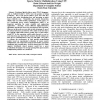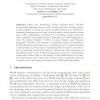36 search results - page 2 / 8 » Productivity and performance using partitioned global addres... |
PPOPP
1997
ACM
13 years 9 months ago
1997
ACM
Global addressing of shared data simplifies parallel programming and complements message passing models commonly found in distributed memory machines. A number of programming sys...
LCPC
2007
Springer
13 years 11 months ago
2007
Springer
Recent studies have shown that programming in a Partition Global Address Space (PGAS) language can be more productive than programming in a message passing model. One reason for th...
IPPS
2009
IEEE
13 years 11 months ago
2009
IEEE
Partitioned Global Address Space (PGAS) languages provide a unique programming model that can span shared-memory multiprocessor (SMP) architectures, distributed memory machines, o...
WCE
2007
13 years 6 months ago
2007
—Partitioned global address space (PGAS) languages, such as Unified Parallel C (UPC) have the promise of being productive. Due to the shared address space view that they provide,...
HPCC
2007
Springer
13 years 11 months ago
2007
Springer
Many new Partitioned Global Address Space (PGAS) programming languages have recently emerged and are becoming ubiquitously available on nearly all modern parallel architectures. PG...


